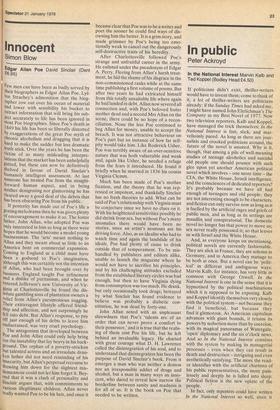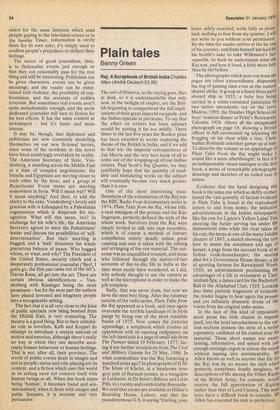In public
Peter Ackroyd
In the National Interest Marvin Kalb and Ted Koppel (Bodley Head £4.50)
If politicians didn't exist, thriller-writers would have to invent them; come to think of it, a lot of thriller-writers are politicians already: if the Sunday Times had asked me, I might have named John Ehrlichman's The Company as my Best Novel of 1977. Now two television reporters, Kalb and Koppel, have managed the trick themselves: In the National Interest is fast, slick, and marvellously paced. As long as there are journalists and crooked politicians around, the future of the novel is assured. Why is it, though, that among a pile of well-meaning studies of teenage alcoholics and suicidal old people one should pounce with such glee upon yet another American political novel which involves — one more time — the CIA, the White House, Israeli intelligence, and the consciences of dedicated reporters? It's probably because we have all , had enough of teenagers and old people: they are not interesting enough to be characters, and fiction can only survive now as long as it is fuelled by the artificial rages and griefs of public men, and as long as its settings are maudlin and conspiratorial. The domestic novel no longer has that power to move us; sex never really possessed it; so that leaves us with Israel and the White House.
And, as everyone keeps on mentioning, political novels are currently fashionable. They are slick in France, they are solemn in Germany, and in America they manage to be both at once. But a novel can be 'political' in different and ambiguous ways:
Marvin Kalb, for instance, has very little in common with George Orwell. In the National Interest is one in the sense that it is
hypnotised by the political machinations which it is supposed to be exposing. Kalb and Koppel identify themselves very closely with the political system — not because they find it beneficial, but because they find it glamorous. As American capitalism advances with giant bounds, it retains its powers by seduction more than by coercion, with its magical panoramas of Watergate,
'open' diplomacy and the six o'clock news. And so In the National Interest connives
with the system by making its managerial processes — even when they can result in death and destruction — intriguing and even aesthetically satisfying. The more the reader identifies with the artificial charisma of his public representatives, the more painlessely and deeply he is lulled into sleep. Political fiction is the new opiate of the people.
In fact, only reporters could have written In the National Interest so well, since it
caters for the • same interests which send people gaping to the television screen or to the Sunday Times. Information is rarely there for its own sake; it's simply used to confirm people's prejudices or titillate their feelings.
The secret of good journalism, then, is to fictionalise events just enough so that they can reasonably pass for the real thing and still be interesting. Politicians can be given characters, events can be given meanings, and the reader can be entertained with violence, the possibility of confrontation, and the certainty of sudden reversals. But sometimes real events aren't quite melodramatic enough, and the more dedicated journalist will turn to fiction for his best effects. It has the same content as newspapers — but it's faster and more intense.
It may be, though, that diplomats and politicians are now constantly modelling themselves on our new fictional heroes, since some of the incidents in this novel have been satisfyingly overtaken by reality. The American Secretary of State, Vandenberg, is shuttling across the Middle East at a time of complex negotiations; the Israelis and Egyptians are moving closer to each other by the hour, and a group of Rejectionist Front states are meeting somewhere in Syria. Will it mean war? Will it mean anything? And then, to add the cherry to the cake, Vandenberg's lovely and gracious wife is kidnapped by a Palestinian organisation which is desperate for recognition. What will this mean, too? In exchange for his wife's life, the American Secretary agrees to meet the Palestinians' leader and discuss the possibilities of 'selfdetermination'. But their meeting is bugged, and a 'leak' threatens the whole precarious balance of peace. Who bugged whom, or what, and why? The President of the United States, security chiefs and a desperately professional journalist ('Bert, I gotta go; the film just came out of the lab'), Darius Kane, all get into the act. There are certain obvious identifications — Vandenberg with Kissinger being the most prominent — but for the most part the authors have placed invented and imaginary people into a recognisable setting.
The fact that it is all very close to the kind of public spectacle now being beamed from the Middle East, is very reassuring. The theatre is a good thing. But in their unfamiliar role as novelists, Kalb and Koppel do attempt to introduce a certain amount of motive and emotion, although there's really no way in which they can describe accu rately human behaviour or human feelings.
That is not, after all, their province. The world of public events deals in images and not in people; status and role-playing are its content, and a fiction which uses this world as its setting need not concern itself with human beings at all. When this book starts being 'human', it becomes banal and sensationalised; when it deals with images and public fantasies, it is accurate and very persuasive.



































 Previous page
Previous page